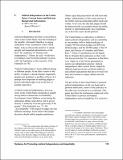|
Reseña:
|
Reseña:Judicial independence has been a core politicalvalue in the United States since the founding ofthe republic. Alexander Hamilton, in urgingratification of the constitution of the UnitedStates, took as obvious the need for ?a steady,upright, and impartial administration of thelaws? by a judiciary of ?firmness andindependence.? Liberty, he said, ?would haveeverything to fear from [the judiciary?s] unionwith? the legislature or the executive. (TheFederalist: no 78)?Judicial independence? means different thingsto different people. At the least it refers to theability of judges to decide disputes impartiallydespite real, potential, or proffers of favor. It isperhaps most important in enabling judges toprotect individual rights even in the face ofpopular opposition.A belief in judicial independence, however,exists in the United States alongside an equallystrong belief in democratic accountability.Government, James Madison wrote during theratification debate, must derive ?all its powerdirectly or indirectly from the great body of thepeople.? (The Federalist: nos. 37, 39)?Accountability? with respect to judges also hasdifferent meanings. Some believe that judges?decisions should reflect popular preferences.Judicial independence has been a core political value in the United States since the founding ofthe republic. Alexander Hamilton, in urging ratification of the constitution of the United States, took as obvious the need for ?a steady, upright, and impartial administration of the laws? by a judiciary of ?firmness and independence.? Liberty, he said, ?would have everything to fear from [the judiciary?s] union with? the legislature or the executive. (The Federalist: no 78)?Judicial independence? means different things to different people. At the least it refers to the ability of judges to decide disputes impartially despite real, potential, or proffers of favor. It is perhaps most important in enabling judges to protect individual rights even in the face of popular opposition. A belief in judicial independence, however, exists in the United States alongside an equally strong belief in democratic accountability. Government, James Madison wrote during the ratification debate, must derive ?all its power directly or indirectly from the great body of the people.? (The Federalist: nos. 37, 39) ?Accountability? with respect to judges also has different meanings. Some believe that judges? decisions should reflect popular preferences. Others reject that proposition but still insist that judges? administration of the courts and use of tax dollars must accommodate public needs and wishes. At its core, the idea that judges should be democratically accountable means the public, directly or representationally, has a legitimate say in how the courts should perform. The United States is a laboratory of efforts to adjust judicial independence and accountability to one another, with its federal judiciary of roughly 900 life tenured judges and 800 term limited judges, and the 28,000 judges of the 50 states, the District of Columbia, and Puerto Rico. These 53 jurisdictions are all largely free to structure their judiciaries as they wish. The lesson from the U.S. experience is that there is no single set of provisions guaranteed to achieve an independent judiciary. Judicial independence takes various forms, shaped by different legal provisions, political traditions, and cultural expectations that have evolved over time and continue to inspire debate and selfreflection. The provisions in the United States to promote judicial independence on the one hand and to promote democratic control of the judiciary on the other may be arrayed on a continuum. This paper describes the mechanisms employed in the United States to protect and balance independence and accountability. It is critical to keep in mind that these mechanisms operate inn environment imbued with an underlying cultural presumption that public officials and private interests are not to tamper with judicial decision-making. This presumption, discussed in this article?s final section, draws strength from a basic popular respect for the role of a judge. Selection of a competent, honest, and diverse judiciary is essential, both for maintaining this public confidence and for sustaining the institutional legitimacy of the judiciary. |

